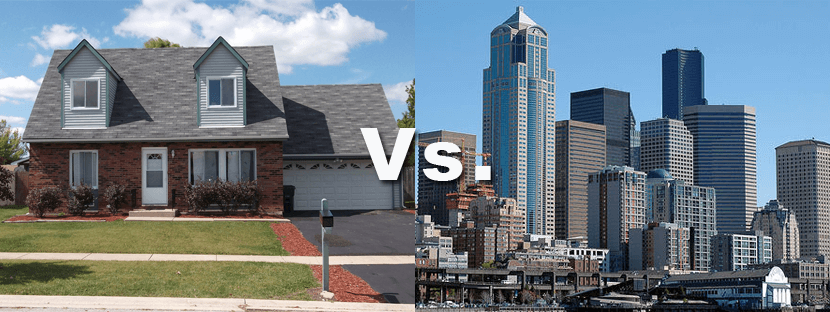As an increasing number of investors are looking for lucrative options in real estate properties, one key question that arises is whether you should invest in a residential or commercial property. It must be remembered that there is no ‘one-size-fits-all’ solution, and the answer depends on a host of different factors that which determine property investment will work best for you.
Key factors that determine the investment decision:
Global trends
The growth prospects of your property are largely dictated by local as well as global cues. A weak economy will lead to low demand, soft rental rates, and low growth rate of the value of your commercial property. Thus, if the economy is on the brink of the recession, and if you are planning to invest in a commercial property it is wise to be cautious. As businesses will be struggling to survive and deterring any expansion plans, you will find it hard to rent or sell your property. A new jersey property appraiser can help you to investigate the global cues and help you make an informed decision pertaining to your investment decision.
Similarly, if you are looking to invest in a residential property and earn rental income, you must research the trend of interest rates. Low-interest rates will push more buyers to invest in properties, and will often lead to increased number of vacant properties.
Local issues
Understanding the local market scenario before taking a plunge to buy residential or commercial is essential, as local trends sometimes tend to contradict the national trends. A high demand for family homes in your community will always result in high rental rates. While the tight zoning laws can imply that the commercial properties in that area will always be in high demand, irrespective of global trends in the economy.
With commercial property appraisal services, an investor is in a better position to understand the changing scenarios and seal your deal in a more profitable way.
Personal issues
You may buy residential property to live in or for investment. Similarly, you can either buy a commercial property as a business owner or use it as an investment. If you decide to become a commercial tenant, it can benefit you if have firsthand knowledge of commercial deals, understand the rules and regulations, and envisage the underlying risk.
Benefits of owning a residential property
- Renting a residential unit tends to be generally easy and quick since the turnover in housing is high, and the demand for good housing is every present.
- As leases are usually short, it is possible to keep pace with the changing rental trends and take advantage of the rise in rental rates.
- It is easier to find financial backing for residential units as the investment value is generally low. Also, the entire process is fairly simple, often similar to financing a home.
- If you own a multi-family property, it becomes easier to manage the property with you being present on the premises.
Benefits of owning commercial property
- As commercial leases tend to be longer, with the exception of smaller offices, you can take advantage of built-in escalations.
- Many commercial leases include a decree that allows the owners to share certain expenses such as property taxes or maintenance fees with the tenants, which helps to stabilize the cash flow and make it steady.
- Managing a commercial property is little easier than residential as many commercial leases include the onus of managing the property on the tenant, thus making tenants responsible for interior repairs, daily maintenance, and renewal costs.
- If the economy is favorable, then an investor can reap a high positive return on the initial investment, which many other financial products fail to offer.
All things considered, the decision to invest in a commercial or a residential property depends on the investor preferences and circumstances with consideration to issues such as risk appetite, personal involvement in the venture, and the time period of the investment.

